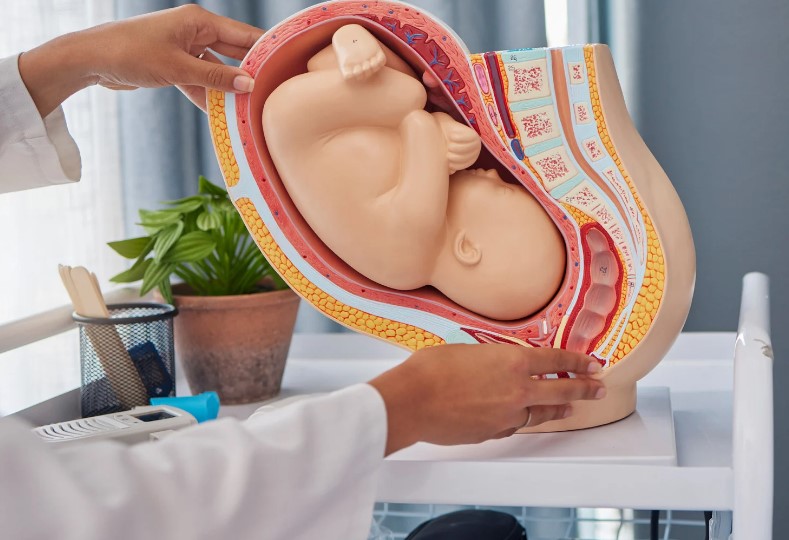Kirsten Fisch, MSN, RNC-MNN, IBCLC, LCCE Kirsten is a women's health nurse who specializes in high-risk pregnancy and postpartum care. She is certified in Maternal Newborn Nursing, a board-certified lactation consultant (IBCLC), and a Lamaze Certified Childbirth Educator. She works with women from conception through the postpartum period. Passionate about empowering women throughout their reproductive journeys, Kirsten combines evidence-based care with compassionate support to promote the health and well-being of mothers and babies.
Bringing a baby into the world is a life-changing experience. While the postpartum period is often associated with bonding and recovery, many new mothers face unexpected challenges, including fear of intercourse after childbirth. This fear is real, valid, and more common than many realize. Yet, it is rarely discussed openly, leaving many women feeling isolated and confused.
Why Does Fear of Intercourse Happen?
Fear of resuming sexual activity postpartum can stem from a variety of physical, emotional, and psychological factors, including:
1. Physical Pain and Discomfort
Childbirth, whether vaginal or via cesarean section, places a tremendous strain on the body. Vaginal deliveries can cause tearing, episiotomies, or trauma to the pelvic floor, leading to pain during intercourse (dyspareunia). Even women who have had C-sections may experience discomfort due to surgical scars or residual pelvic pressure.
2. Hormonal Changes
Postpartum hormones can lead to vaginal dryness, particularly for breastfeeding mothers with lower estrogen levels. This can make sex uncomfortable and further increase anxiety around resuming intimacy.
3. Emotional and Psychological Barriers
Many new mothers struggle with changes in body image, feelings of exhaustion, and concerns about their attractiveness after pregnancy. Additionally, postpartum depression or anxiety can significantly impact libido and the ability to engage in sexual activity without fear or distress.
4. Trauma and PTSD
For some women, childbirth itself is a traumatic event, leading to postpartum post-traumatic stress disorder (PTSD). If a woman experienced a difficult labor, emergency interventions, or felt a loss of control, these experiences might be subconsciously linked to fear of intercourse.
Steps Toward Healing and Comfort
Overcoming fear of intercourse after childbirth requires patience, open communication, and self-compassion. Here are some strategies to help navigate this journey:
1. Communicate With Your Partner
Honest conversations about feelings, fears, and physical states can help rebuild intimacy. Let your partner know what you’re experiencing and what you need from them—whether it’s more time, gentle reassurance, or non-sexual forms of closeness.
2. Seek Professional Support
A healthcare provider can evaluate any physical pain and recommend treatments such as pelvic floor therapy, lubricants, or hormonal creams. Additionally, mental health professionals can help address emotional concerns related to fear, trauma, or postpartum depression.
3. Take It Slow and Prioritize Comfort
There is no rush to resume intercourse. Doing gentle physical touch, cuddling, and non-penetrative intimacy can help rebuild comfort without pressure. When you feel ready, using ample lubrication and finding comfortable positions can make a significant difference.
4. Strengthen the Pelvic Floor
Kegel exercises and pelvic floor therapy can improve muscle tone and reduce discomfort during intercourse. A specialized pelvic floor physical therapist can provide personalized exercises and support.
5. Redefine Intimacy
Intimacy is more than just intercourse. Rebuilding emotional closeness through small gestures—holding hands, affectionate words, or shared activities—can help couples reconnect without pressure.
6. Give Yourself Grace
The postpartum period is filled with physical and emotional changes. It’s okay to feel different and take the time to heal. Everyone’s journey is unique, and no “normal” timeline exists for resuming intimacy.
Moving Forward
Fear of intercourse after childbirth is a valid and complex issue, but with support, time, and self-care, it is possible to overcome. New mothers can navigate this transition more easily by prioritizing communication, seeking professional help, and embracing patience.
Above all, remember: your body has done something incredible, and healing—physically, emotionally, and sexually- is a process that deserves gentleness and understanding.

Kirsten Fisch, MSN, RNC-MNN, IBCLC, LCCE Kirsten is a women's health nurse who specializes in high-risk pregnancy and postpartum care. She is certified in Maternal Newborn Nursing, a board-certified lactation consultant (IBCLC), and a Lamaze Certified Childbirth Educator. She works with women from conception through the postpartum period. Passionate about empowering women throughout their reproductive journeys, Kirsten combines evidence-based care with compassionate support to promote the health and well-being of mothers and babies.






